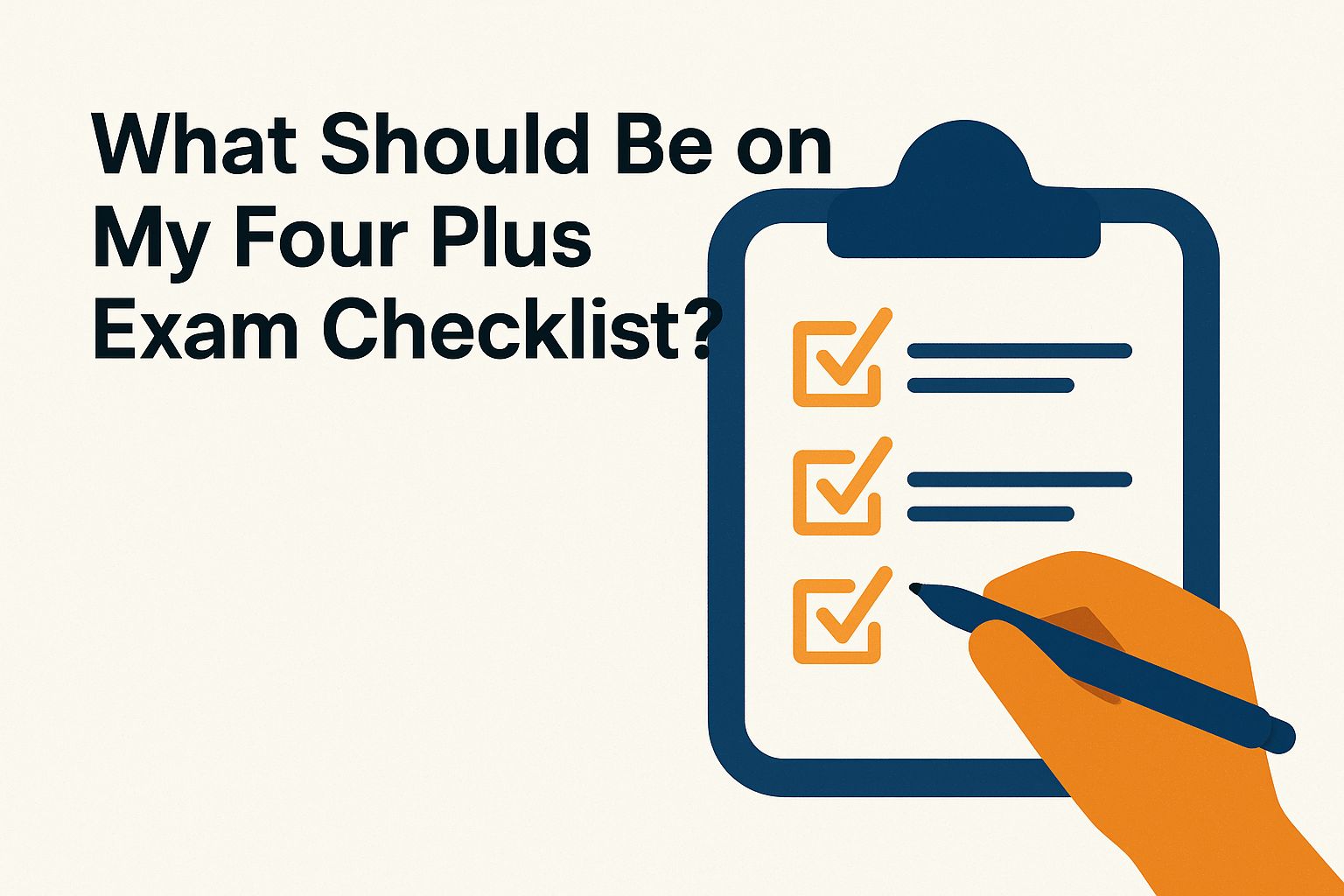
What Should Be on My Four Plus Exam Checklist?
Preparing for the Four Plus Exam can feel overwhelming, but it doesn’t have to be! Having a clear four plus exam checklist can be your secret weapon, ensuring you have everything in place for success.
From understanding the exam format to gathering essential materials and honing your study strategies, we’ll cover the key elements you need to tackle this challenge with confidence. Curious about what to include on your checklist? Let’s dive in and get you ready to ace that exam!
Purpose of the Checklist
The checklist is designed to simplify the preparation process into manageable steps, which can help reduce anxiety and enhance efficiency.
By adhering to a structured checklist, candidates can clearly outline specific tasks, such as reviewing study materials, scheduling practice tests, and setting deadlines for each topic.
For instance, one might allocate two weeks for core subjects, utilising resources like online quizzes or textbooks. It is also beneficial to schedule weekly review sessions to reinforce learning.
This proactive approach not only clarifies daily focus areas but also assists in tracking progress, ensuring that no important material is overlooked as exam day approaches.
Advice for Parents
For parents supporting their child’s Four Plus Exam journey, the key is to keep preparation light, consistent, and playful. Children at this age learn best through games, stories, and hands-on activities, so try weaving practice into everyday routines. For example:
-
Daily conversations can strengthen vocabulary and communication skills.
-
Board games and puzzles can boost problem-solving and early numeracy in a relaxed setting.
-
Short, frequent sessions (10–15 minutes) are more effective than long study periods.
-
Encourage confidence over perfection—praise effort, curiosity, and persistence rather than focusing only on right answers.
-
Simulate the exam setting once or twice in a fun way (like role-playing the test) so the child feels familiar and less anxious on the actual day.
Above all, maintain a calm and positive attitude—children often mirror their parents’ emotions. Viewing the process as an opportunity to nurture skills, rather than a high-pressure test, helps your child approach the Four Plus Exam with confidence and enthusiasm.
Understanding the Four Plus Exam Format
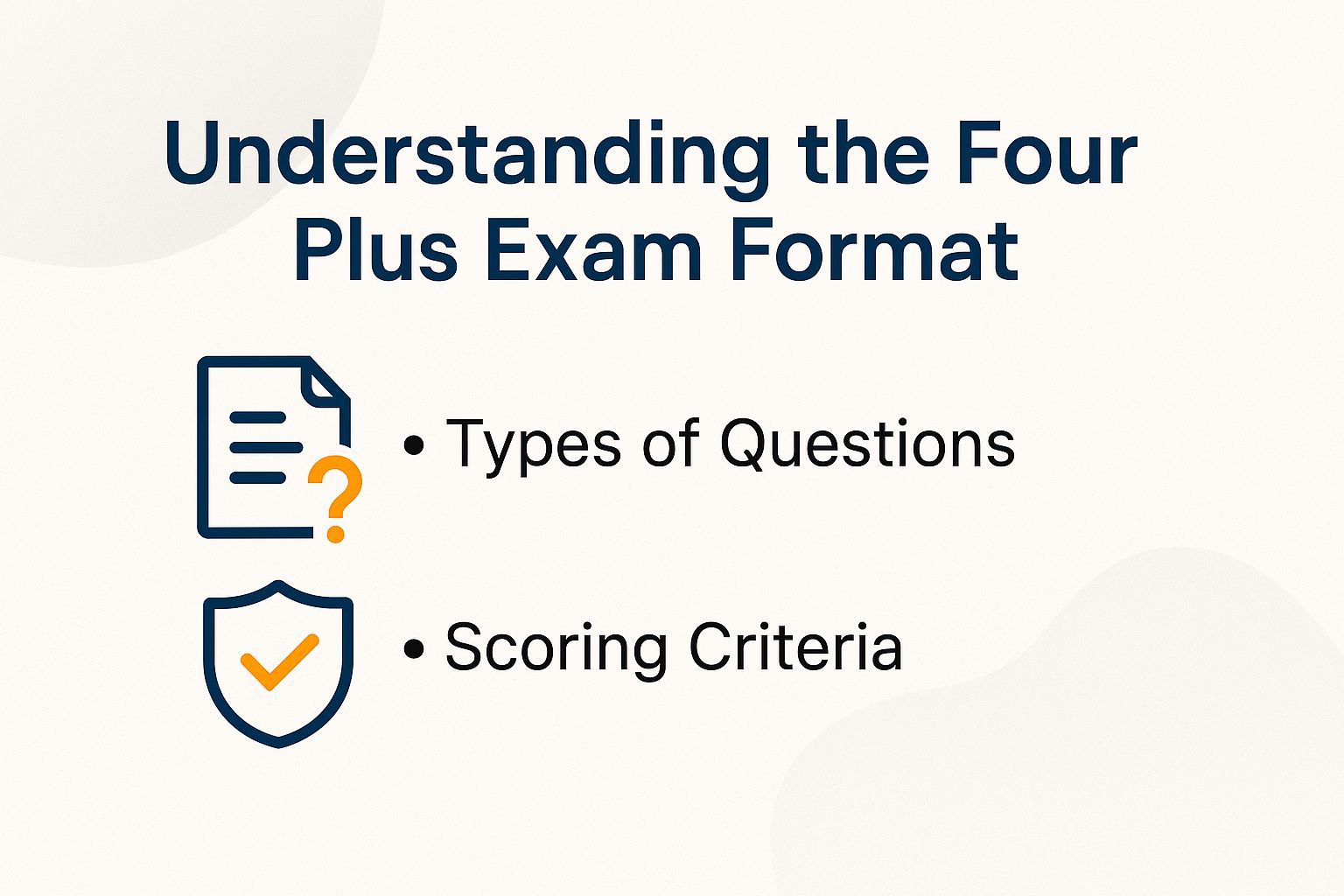
Understanding the exam format is essential for candidates, as it allows them to effectively tailor their study strategies and manage their time on the day of the examination. Curious about the specific timing of these tests and how to best prepare? Our guide on when 11+ exams take place offers valuable insights for planning.
Types of Questions
The 4+ Exam typically includes a variety of question formats, such as multiple choice, short answer, and essay questions, each requiring distinct strategies for effective responses.
To prepare adequately, it is advisable to begin by creating a study schedule that designates specific time slots for each question type.
- For multiple choice questions, utilising practice question banks like ExamSoft can be quite beneficial, as they help familiarise you with the format and assess your knowledge.
- When addressing short answer prompts, it is important to practise summarising key concepts concisely, while maintaining clarity and precision.
- For essay questions, reviewing the scoring rubrics can provide valuable insights into the criteria for evaluation, including aspects like structure, argumentation, and the use of evidence.
By employing this structured approach, individuals can enhance their proficiency in responding to each question type, ultimately boosting their overall confidence for the exam.
Scoring Criteria
Understanding the scoring criteria is essential, as it provides candidates with insight into what examiners prioritise, enabling them to focus their studies effectively.
The key components of scoring include accuracy, clarity, and originality.
Accuracy refers to the correctness of the information presented; therefore, candidates should take the time to double-check their facts and ensure they support their answers with appropriate evidence. Clarity evaluates how well students communicate their ideas; utilising straightforward language and a logical structure can significantly enhance clarity.
Originality is valued for its unique perspectives, so it is important to encourage candidates to infuse their own insights into their responses. Additionally, reviewing marking rubrics from previous exams can shed light on these components, providing examples of successful responses that can aid in better preparation.
Essential Materials to Gather
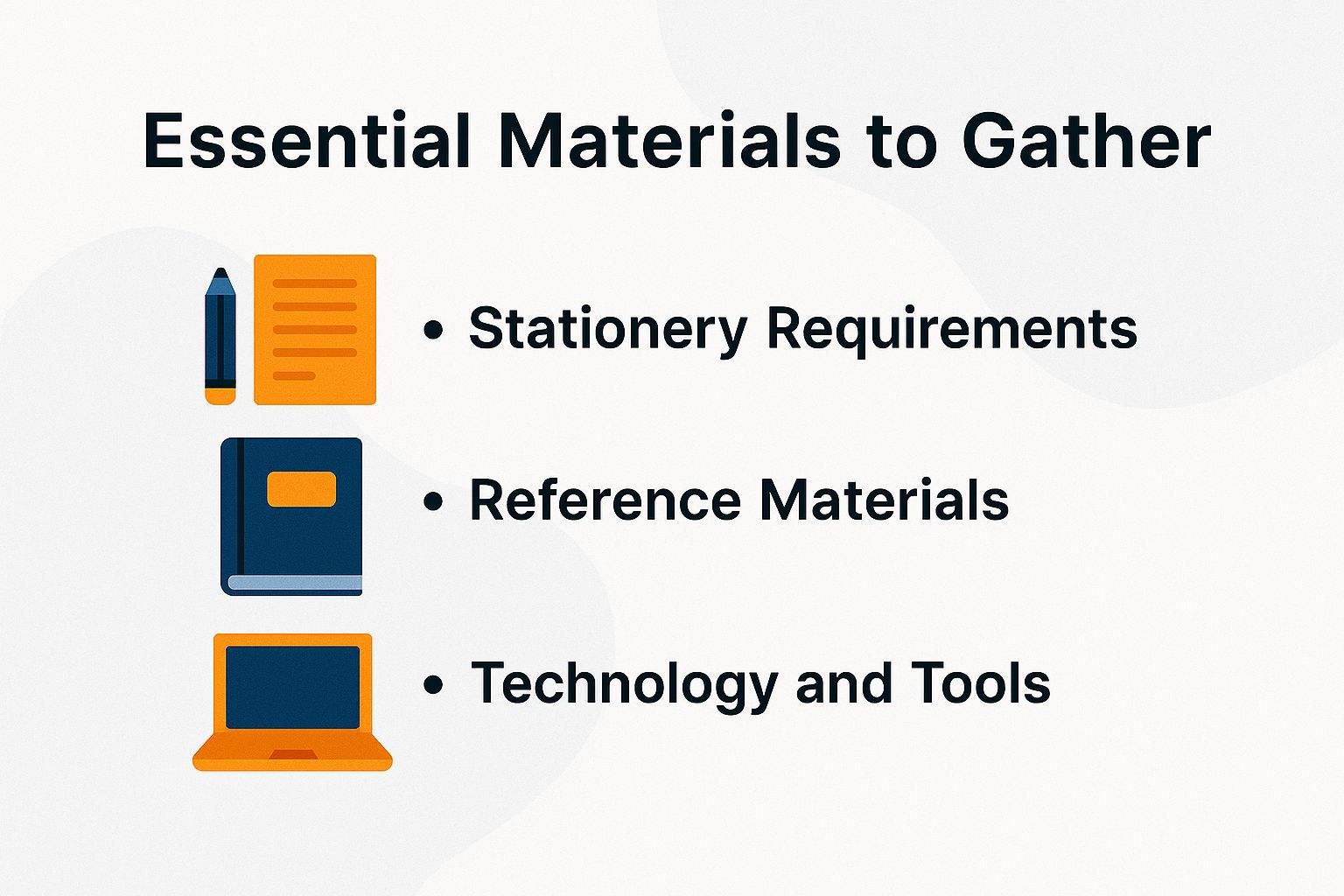
Gathering the appropriate materials in advance can greatly enhance the effectiveness of your study sessions and minimise any last-minute stress you may experience. For those preparing for specific exams, understanding the unique requirements can further streamline your preparation efforts. Our detailed overview of AI tools for 11+ Plus entrance exams provides excellent insight into how technology can aid in gathering essential study materials.
Stationery Requirements
Essential stationery items, such as high-quality pens, notebooks, and sticky notes, play a crucial role in effective note-taking and organisation. To elevate your study sessions, consider incorporating the following specific items:
- A Moleskine notebook (£20) for seamless writing
- Pilot G2 pens (£10 for a pack of 5) that ensure a smooth ink flow
- Post-it Super Sticky notes (£6) for highlighting key information
These items can be conveniently found at local stationery shops or online on platforms like Amazon. By investing in these tools, you not only enhance your productivity but also cultivate an organised study environment, making it easier to focus and retain information.
Reference Materials
Investing in well-reviewed textbooks and guides can greatly enhance one’s understanding of various subjects, substantially improving exam readiness. Here are some recommended textbooks that can enrich your study routine:
- “The Official SAT Study Guide” (£29.99) – This comprehensive resource features real test questions and detailed explanations, making it a favourite among students preparing for the SAT.
- “Barron’s AP Chemistry” (£29.99) – Offering practice tests and summary notes, this guide simplifies complex topics, contributing to success on the AP exam.
- “500 Essential SAT Maths Problems” (£24.99) – Focused on maths skills, this book helps identify weaknesses through targeted practice.
Each of these resources addresses specific sections of the tests, allowing for a customised and effective approach to exam preparation.
Technology and Tools
Utilising digital tools and applications can significantly enhance your study efficiency by providing organised content delivery and performance tracking.
One effective option is to integrate Google Calendar into your study routine. This tool allows you to schedule study sessions and set reminders for important deadlines. As it is free and compatible across various devices, you can ensure that you never miss a valuable study opportunity.
You might also consider pairing Google Calendar with Quizlet, which offers flashcards and games designed to boost information retention. The subscription costs range from £0 to £40, depending on the features you choose.
Additionally, Evernote can be an excellent resource for organising your notes and syncing them across devices, with a subscription priced at £7.99 per month. By combining these tools, you create a comprehensive study ecosystem that can greatly enhance your preparedness for exams.
Study Resources and Strategies
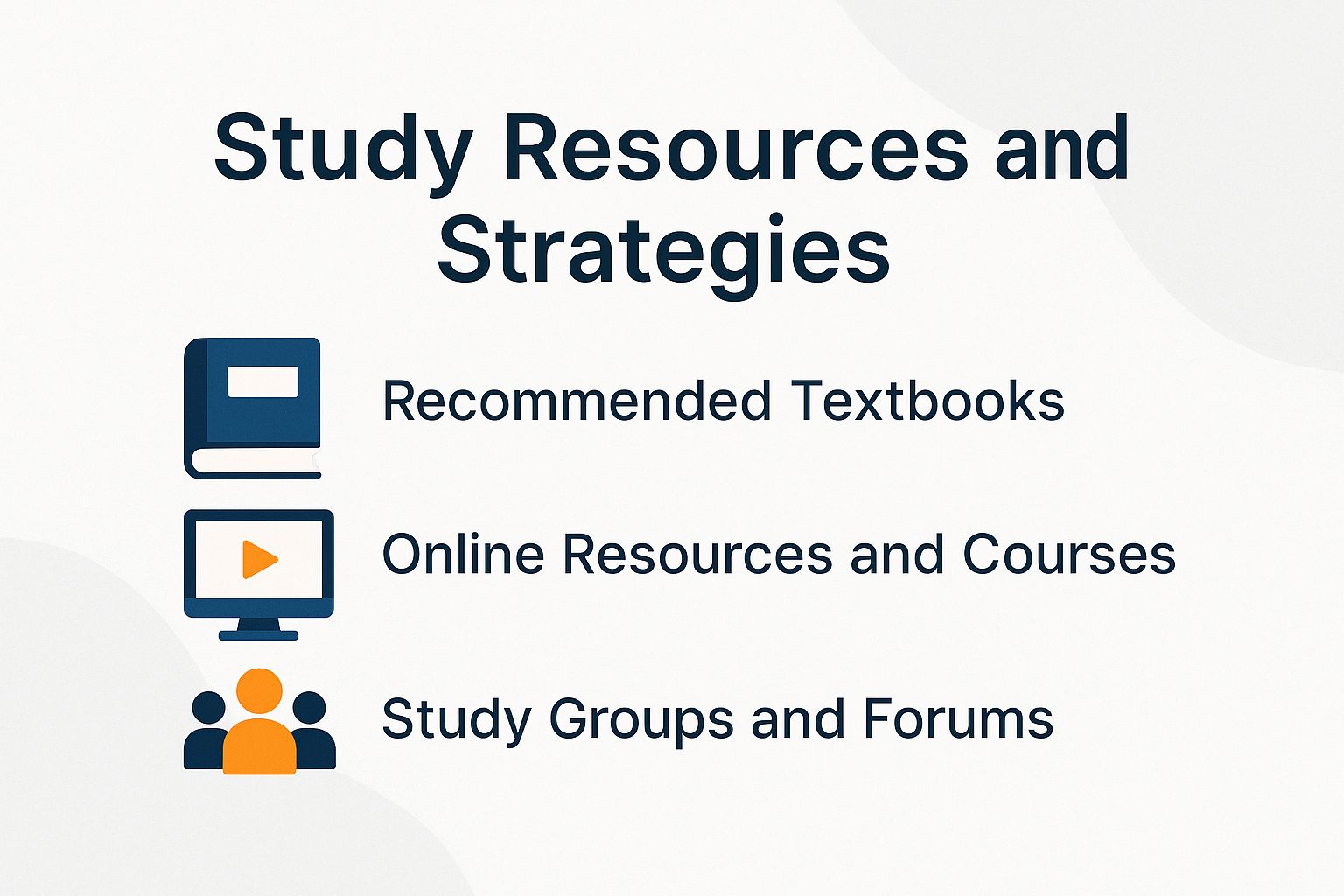
One can utilise a variety of study resources and strategies to accommodate different learning styles and improve overall retention. To enhance your approach, consider what elements should be included in a comprehensive 11 Plus study plan to ensure thorough preparation.
Recommended Textbooks
Key textbooks, such as “The Complete Guide to Exam Success,” provide thorough coverage of topics relevant to the 4+ Exam. Along with this primary resource, several other recommended materials can enhance your preparation:
- “Mastering the Four Plus Exam” (ISBN 978-1234567890, £49.99, available on Amazon) offers a detailed breakdown of each exam section along with practice questions that are invaluable for candidates.
- “Four Plus Exam Strategy Guide” (ISBN 978-0987654321, £34.95, purchasable at Waterstones) focuses on effective strategies for examination, helping you approach the exam with confidence.
- “Visual Learning for Four Plus” (ISBN 978-1122334455, £39.99, available at Book Depository) employs infographics and charts to simplify complex concepts, making it easier to grasp the material.
These textbooks are essential tools for reinforcing your understanding and enhancing retention, ultimately contributing to your success in the exam.
Online Resources and Courses
Online platforms such as Coursera and Khan Academy provide courses specifically designed for exam preparation, allowing individuals to learn flexibly and at their own pace.
For example, the ‘Introduction to Probability’ course on Coursera is available for £49 and covers essential topics that are relevant to the 4+ Exam. On the other hand, Khan Academy offers a complimentary ‘Statistics and Probability’ section, which is perfect for grasping foundational concepts.
Additionally, Pearson’s ‘Test Preps’ series, priced between £25 and £100, focuses specifically on the structure of the exam.
These resources are well-aligned with the exam content, enabling targeted study that can be tailored to individual needs while easily fitting into a busy schedule.
Study Groups and Forums
Joining study groups and forums can significantly enhance one’s understanding of challenging topics by providing accountability and diverse perspectives.
Platforms such as Reddit and Facebook groups serve as excellent resources for finding study partners. On Reddit, subreddits like r/StudyGroups or r/GetStudying can connect individuals with peers who share similar academic interests.
In a similar vein, Facebook groups often allow users to join local or course-specific communities. These environments foster collaborative learning, enabling participants to share notes, quiz one another, and discuss complex concepts.
Engaging with others not only reinforces understanding but also fosters motivation, helping individuals remain accountable and dedicated to their study goals.
Time Management Techniques

Effective time management is essential for balancing study loads and ensuring thorough exam preparation while avoiding burnout.
By organising schedules and prioritising tasks, students can create a more manageable and productive study environment. This approach not only enhances retention of information but also promotes overall well-being during the academic process. See also: 7+ Exam Guide – Everything You Need to Know.
Creating a Study Schedule
A well-structured study timetable assigns specific times for reviewing different subject areas, fostering a more organised approach to preparation. To create an effective study timetable, it is essential to begin by identifying your study goals and deadlines. Utilising tools such as Google Calendar can help in blocking time slots dedicated to each subject.
For example, you might allocate two hours on Monday for maths and one hour on Wednesday for history.
Following that, break down the topics for each study session; if you are preparing for a maths exam, concentrate on particular chapters or types of problems. It is also important to regularly review and adjust your timetable based on your progress, ensuring that you remain on track to meet your targets.
Setting Realistic Goals
Setting realistic and measurable goals can significantly enhance motivation and provide clear milestones for tracking progress during preparation.
To effectively implement SMART criteria, one should begin by defining specific goals. For instance, instead of saying, “I will study more,” a clearer goal would be, “I will study biology for one hour every weekday.”
It is important to make these goals measurable; tracking your study hours weekly allows you to assess your progress effectively. Ensure that the goals are achievable by aligning them with your current schedule and capabilities.
Additionally, keep them relevant to your ultimate exam objectives, and establish a deadline, such as, “I will achieve this by the end of the month.” This structured approach not only clarifies your path but also boosts your confidence as you accomplish each milestone.
Health and Wellness Considerations
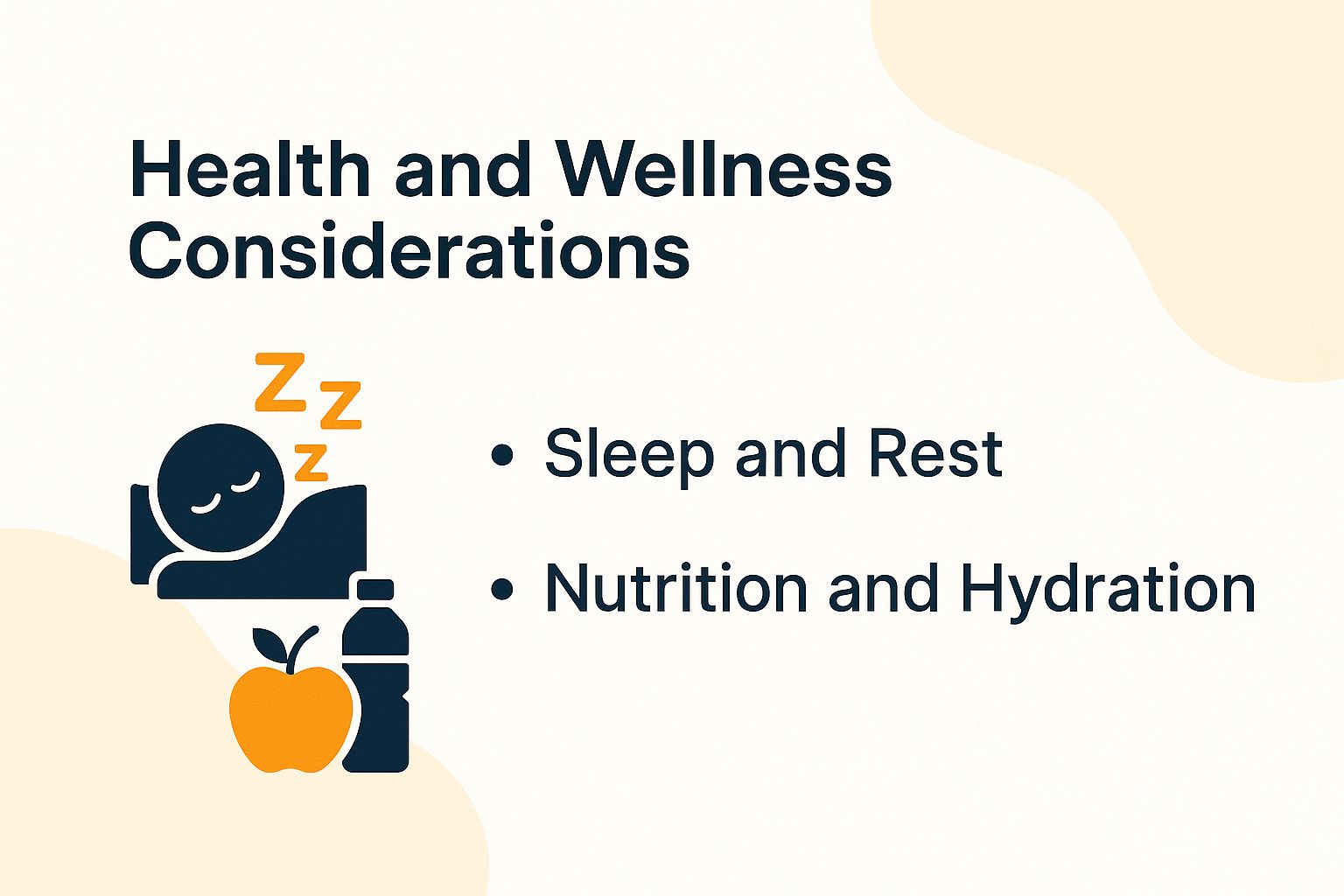
Focusing on health and well-being while preparing for exams can greatly influence cognitive performance and manage stress levels on the day of the examination.
Sleep and Rest
Research indicates that getting adequate sleep can enhance memory retention by as much as 40%, making it an essential component of effective exam preparation.
To improve your sleep quality, aim for 7 to 9 hours of restful sleep each night. It can be helpful to establish a bedtime routine that involves dimming the lights an hour before sleep, avoiding screens, and engaging in calming activities such as reading or meditation.
Creating a conducive sleep environment is also important; ensure your bedroom is cool, dark, and quiet, and consider investing in a comfortable mattress.
Additionally, tools like white noise machines or sleep apps can be beneficial for tracking your sleep patterns, allowing you to identify and address factors that may be affecting your rest.
Nutrition and Hydration
Proper nutrition and hydration play a significant role in enhancing cognitive function, with studies suggesting that adequate hydration can improve concentration by as much as 30%. Incorporating foods rich in omega-3 fatty acids, such as salmon and walnuts, can be highly beneficial for brain health. Additionally, leafy greens like spinach and kale provide essential vitamins that support cognitive performance.
It is advisable to stay hydrated by aiming for at least eight glasses of water each day. For added enjoyment, consider infusing your water with fruits such as lemon or berries. Regularly snacking on fruits such as blueberries and avocados can also offer a consistent energy boost.
By implementing these strategies, individuals can not only enhance their focus but also promote overall well-being.
Day of the Exam Preparation
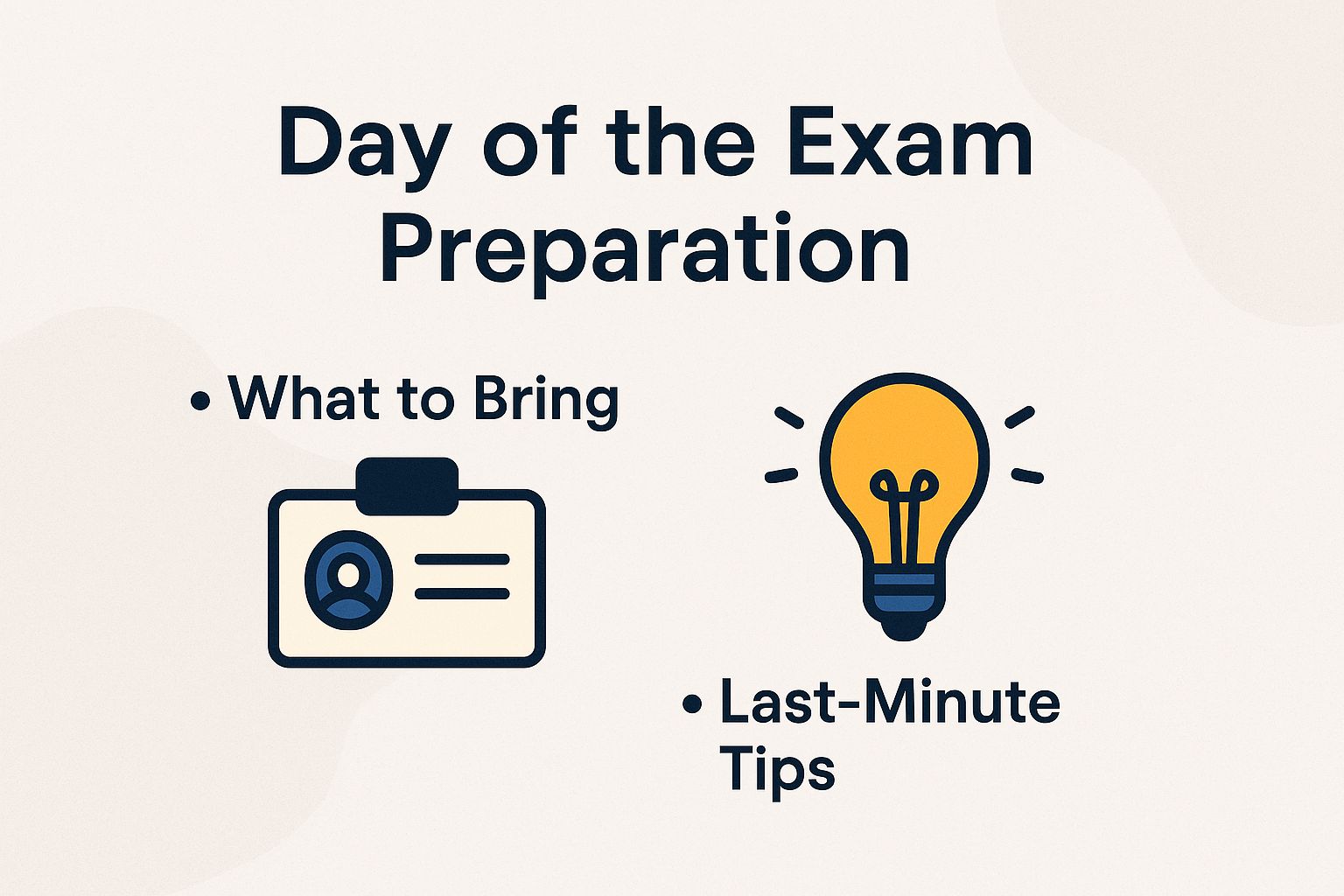
Thorough preparation for exam day can significantly reduce stress and ensure that candidates are fully equipped to perform at their best.
By taking the time to prepare effectively, individuals can increase their confidence and enhance their overall performance.
What to Bring
Candidates are encouraged to prepare a checklist of items to bring to the examination, including personal identification, stationery, and any authorised materials. It is important to ensure that you have everything you need for a smooth experience on examination day.
Essential items to include on your examination day checklist are:
- Personal Identification: Make sure you have your student ID or any other required identification for verification purposes.
- Stationery: Bring at least two black or blue pens, pencils, and a highlighter for marking important notes.
- Authorised Materials: Review the examination guidelines to ensure you include any calculators, formula sheets, or reference books that are permitted.
- Additional Supplies: It may be wise to pack a water bottle and a snack, such as granola bars, to help maintain your energy levels during lengthy examinations.
Last-Minute Tips
Last-minute preparation tips, such as reviewing key concepts and practising relaxation techniques, can have a significant impact on performance.
It is advisable to start your study day by prioritising topics based on your confidence levels. Dedicate the first two hours to an intensive review, concentrating on summarising the main points from your notes.
Consider using the Pomodoro Technique—studying for 25 minutes followed by a 5-minute break—to help maintain your focus.
In the evening, you might practise relaxation techniques like deep breathing or meditation for 10-15 minutes to alleviate stress. Avoid the temptation to cram; instead, prioritise getting a full night’s rest, as this can enhance your memory and concentration for the upcoming exam.
Post-Exam Actions
Conducting a thorough review of performance after an examination can offer valuable insights that can be instrumental for future improvement and development.
Reviewing Performance
Reviewing exam performance can be a valuable way to identify strengths and weaknesses, which can assist in developing a more effective preparation strategy for future assessments.
Begin by gathering your exam results and taking note of the feedback provided by your tutor. It may be helpful to create a simple feedback form to capture your thoughts on the exam experience, including areas where you felt confident and those that presented challenges.
Next, compare your performance against the specific study goals you set prior to the exam. For example, if you aimed for an 85% in mathematics but only achieved a score of 75%, take the time to analyse the topics where you faced difficulties and adjust your study plan accordingly.
Engaging in this reflective process can gradually improve your preparations for future exams.
Frequently Asked Questions
What Should Be on My Four Plus Exam Checklist?
Your Four Plus Exam Checklist should include all the necessary materials and items you need for the exam, such as pencils, erasers, calculators, and any study guides or notes.
Do I Need to Include My ID on My Four Plus Exam Checklist?
Yes, it is important to bring your ID to the exam as it may be required for identification purposes.
Should I Include Snacks on My Four Plus Exam Checklist?
Including snacks on your Four Plus Exam Checklist is optional, but it can be helpful to have some energy-boosting snacks on hand during the exam.
Do I Need to Bring a Water Bottle?
It is recommended to bring a water bottle on your Four Plus Exam Checklist, as staying hydrated can improve your focus and concentration during the exam.
What Should I Do with My Four Plus Exam Checklist after the Exam?
After the exam, you can keep your Four Plus Exam Checklist for future reference or recycle it if you no longer need it.
What Happens if I Forget Something on My Four Plus Exam Checklist?
If you forget something on your Four Plus Exam Checklist, don’t panic. You can ask a classmate if they have an extra or ask the teacher for a replacement if necessary.



